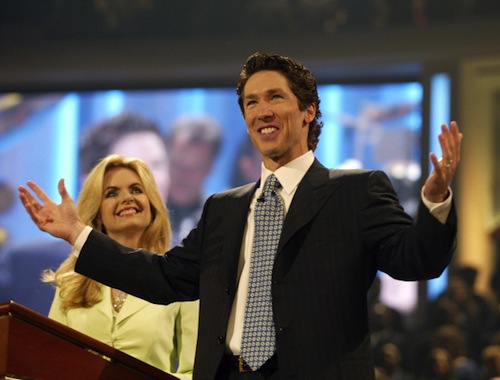This morning, the daemon Facebook brought me the news that Texas megachurch pastor Joel Osteen had resigned his position and renounced Christianity. The article also warned that people would try to tell me it was all a hoax. My suspicions were piqued by an interview in which Osteen uses pretty much the same diction and syntax as the interviewer, and they were confirmed by this ABC News report. ABC News is fairly reliable, even if they did say the hoax had him “telling his many followers he was denouncing [sic] the Christian faith.” Also, the problem of an unknown source that offers fantastic information while warning that people will try to tell you it’s a hoax should be familiar to anyone who has read the Bible.
But like I said, I get my news from a more reliable source: Facebook. That poses a problem, since I technically have no way to be certain that Osteen is a real person, much less that he loved Christianity and then didn’t. Again we encounter the problematic distinction between events and news. I have a pretty good sense of what is real and fake in my daily life, because the real things that happen have repercussions that I experience. News, by definition, comprises events that I would not know about if no one told me. How, then, can these events be “real” in the same sense as my neighbor exploding a propane grill in the bed of his truck?
The answer is that they can’t. Yet I still want to make a distinction between real news events and fake ones; the problem is that such distinctions cannot be made on an empirical basis. I instead must rely on the authority of sources, which is why I believe ABC News’s word against a Blogger site called Christianty News Texas. Everyone said the the internet would radically democratize journalism by dissolving the old edifices of corporate news, but in its proclivity for bias and outright dishonesty, the internet has made institutional respectability more important. It is the fastest way to guess whether something is true or not.
The currency of such sites was implicitly endorsed in this video, which shows mock-ups of CNN and Drudge websites running headlines like “Pastor of mega church resigns, rejects Christ.” ABC describes this image as a “screen grab,” which is not true: again, those are fake web pages that the hoaxers made and cut into the video. Pretty much anyone could do the same thing in about ten minutes, and most savvy internet users know that.
Still, just the recognizable layout of CNN.com exercises a powerful authority over our brains’ credulity centers (located next to the part that loves and directly beneath the part that loves Charlie Murphy.) At the same time the internet trains us to take any quote-unquote news with a grain of salt, it paradoxically strengthens our trust in established journalistic institutions. I was not sure whether Joel Osteen really resigned, so I Googled it and looked for a report from one of the major networks.
I don’t think many people would find fault with that approach. How far we have come, though, from the fashionable skepticism of my punk-rock youth. Back when places like ABC were our only significant sources of news, everyone agreed that they presented misleading information to further their corporate/fascist/Top 40 agenda. Now that literally thousands of websites actively try to deceive us for a variety of incoherent reasons, such oppositional skepticism seems a quaint luxury of an earlier time, like whaling. ABC may be the propaganda arm of the Disney Corporation, but at least they’re not cutting fake versions of other people’s websites into videos supporting utterly invented news stories.
That’s all assuming you believe Joel Osteen is real, though. I’m still not entirely willing to rule out the possibility that he is played by the actor who did Tommy Carcetti. After all, how would I know? The question of what to believe on the internet—and, for that matter, in any kind of news—ultimately comes down to how willing you think people are to trick you. If the present age has taught us nothing else, it is that way, way more people want to trick us than we thought. And if you can’t trust the Facebook news reports about the televangelists, what can you trust?




